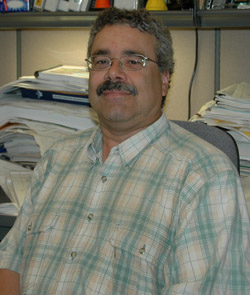By Angela Mathis

Dwayne Stenlund, Environmental Services, recently received the 2010 Presenter of the Year Award for his four-hour technical session workshop entitled Concrete Management Best Practices. Photo by Angela Mathis |
Professionals from around the globe presented at the International Erosion Control Association’s conference earlier this year. Out of this group, Dwayne Stenlund, Environmental Services, recently received the 2010 Presenter of the Year Award for his four-hour technical session workshop entitled Concrete Management Best Practices.
Although Stenlund expressed disbelief for receiving the award, he said, “I suspect I got it because I didn’t hold back. I wasn’t trying to sell the audience anything but ideas.”
An upbeat presentation style, which prompted someone to dub him the Jay Leno of erosion control and which Stenlund describes as “wild, entertaining and humorous,” probably worked in his favor as well.
At Mn/DOT, Stenlund develops pollution management plans and best practices for construction activities. A certified professional in erosion and sediment control, he has worked in the Office of Environmental Services for 15 years, is an adjunct instructor at the University of Minnesota, and gives best practices presentations nationwide.
What is concrete management?
Mn/DOT wouldn’t be Mn/DOT without concrete, but we need to be aware that concrete isn’t the same thing as dirt. Concrete contains toxins, so to protect our natural resources and the public, contractors need to implement plans for concrete dust management, demolition, disposal, reclamation and other operations.
For example, community members living near the I-35 Mega Project in Duluth were adamant about not having concrete dust in their homes. We needed a plan to ensure it stayed on site and the public was minimally exposed to it.
Reusing materials is also an important aspect of best practices—waste in your operation could be raw materials for another.
How do you develop best practices?
I make it up as I go because there aren’t a lot of manuals to follow, but you need to start somewhere. If you do nothing, you might be maximizing profit, but you’re harming workers and the environment.
To develop best practices, I observe, learn the issues and outline procedures that will minimize pollutants. At the end of the day, what matters is that everyone goes home with all body parts, the public is safe and the environment is protected as best as it can be.
How do you get contractors to implement best practices?
I observe contractors and tell them if they’re doing something that violates state and federal laws—then recommend solutions to correct the condition. I also name best practices after contractors who use them well. Some contractors approach me with an innovation because they want to be immortalized by having their name attached to it. Naming has been a great tool to celebrate successes and encourage best practices implementation. If you personalize success and failure, you’ll get change.
Contractors usually don’t mind implementing best practices as long as all contractors are held to the same standards. No one ever complains about too much clean air and water, but people do complain about spending money. In the end, though, it’s cheaper to prevent than to react. My goal is to write provisions to level the playing field.
What are your upcoming projects?
I’ll tackle bituminous pavement best practices next and will make the guidance documents more pictorial-based. I’ve found graphics to be powerful tools for communicating with contractors.
We’re also conducting research with Mankato State University on concrete management best practices for projects throughout the state. Our long-term goal is to develop standards, methods and outcomes that are clear and deliverable, at the lowest possible cost.
A unique thing I’ve been asked to do is instruct military trainees in how not to pollute groundwater when they practice blowing things up during training exercises.
I’ve also been invited to give presentations in several states because of the award.
Do you enjoy presenting?
I suppose I like it, especially the people I meet and all the really interesting ideas they bring to training, but if there were other options, I’d rather not do it.
If I want my job to work, though, I need to invest time in educating people about how and why to follow best practices so they can take that knowledge back into the field to implement every day.
Do you or a co-worker have an interesting job to share with readers? Click here to send us your ideas, and we’ll contact you for more information.
Recent employee profiles:
|



